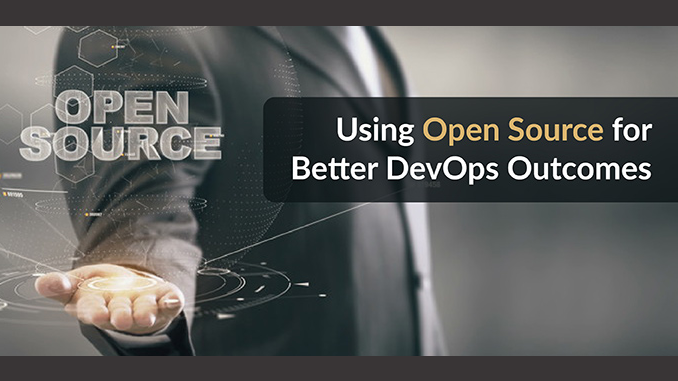
Using Open Source for Better DevOps Outcomes
Many insurers have jumped on the DevOps bandwagon in order to improve the efficiency and effectiveness of their systems and systems implementations. Very few insurers, however, spend much time thinking about the open source software community as a way to improve their DevOps approach–and the skills of their developers–and in that regard they’re missing a golden opportunity. In fact, insurers often restrict their developers from updating or contributing to open source libraries because they don’t realize the potential benefits available to them by participating more actively in the open source community.
A 2016 survey by 451 Group indicated that the more companies used open source solutions in their DevOps portfolios, the more effective the DevOps function was. More specifically, the study reported that among companies with at least 60% of their DevOps portfolio as open source, a full 54% had reached the “fully deployed” DevOps state, with all of their development occurring via DevOps models.
By comparison, only 30% of the surveyed companies that used less than 60% of open source tools in their DevOps portfolios had reached this state of DevOps adoption. Clearly there’s a link between open source use and DevOps success. Given these results, insurers should focus on the benefits of supporting and encouraging their DevOps groups to embrace the open source community.
It’s a dated but still persistent view: Participating and contributing to the open source community means developers are giving away their time by creating and contributing intellectual property (IP) that may benefit others outside the organization. However, the truth of the matter is participating DevOps engineers, developers, analysts, etc. are often fixing bugs and making improvements to code libraries other than their own but that can have value for their own DevOps efforts.
The very definition of open source –software for which the original source code is made freely available and may be redistributed or modified–makes it fertile ground for skills and solutions improvement. Additionally, that process of analyzing and repairing code represents some serious skills development. It’s the kind of development skills that can be difficult to obtain by just working on in-house applications and platforms–which are often proprietary and dated–lacking modern coding techniques.
Since open source literally means a developer and/or organization has the ability to make the code fit their needs however they see fit–they control their own version of the product that may diverge from the original open source project–the opportunity for DevOps solutions improvement is substantial. Moreover, any DevOps related IP a developer creates and contributes is not lost and is certainly not stolen–the IP can be used directly by the developer and that developer can continue to benefit from the IP of other developers on a gratis basis.
Utilizing DevOps solutions from the open source community can be both time and cost effective and can be a positive boon to organizations. While some insurers may not knowingly allow open source code in core systems or applications, its use in a DevOps ecosystem is another matter. That’s especially true since DevOps is a newer and less mature IT function that requires new tool, process and solutions development. Leveraging open source solutions can expedite that process. In fact, many of the key DevOps tools used today either are or started as open source solutions for DevOps problems. One would be hard pressed to find a DevOps development stack–from building/developing to monitoring–that didn’t use at least one open source tool as part of the stack.
Often the fear or apprehension to using open source libraries (for DevOps or anything else) is that anyone could have written it, thus its quality is or could be sub-par. While in some cases this can be true, the same holds true for closed source proprietary software, as many insurers could attest. Simply put, open source tools and libraries are worked on by developers of the exact same caliber–if not the exact same people–who work on closed source proprietary tools and libraries. The only difference is there are often less people involved with proprietary solutions development. And since there are relatively few proprietary DevOps solutions in the marketplace to choose from, open source should be considered a viable channel for DevOps solutions.
Even if there were more choices for proprietary DevOps solutions, the financial savings involved in combining open source solutions with DevOps can be significant. Importantly, open source solutions for DevOps are particularly useful when the right solution for a problem has yet to emerge, almost a given in a maturing DevOps ecosystem. Rather than rushing out to buy something that promises to fix the problem–or writing something themselves–DevOps developers can find open source solutions and use those to experiment, test and otherwise isolate and identify the true nature of and solution to a DevOps challenge.
Another reason DevOps groups should avail themselves of open source techniques and tools is the fact that the tools and techniques available for DevOps–proprietary off the shelf and built inhouse–are still not quite there yet. The tools available are almost always missing something, resulting in developers at many organizations spending most of their time–and the organization’s money–trying to develop fully functional solutions from the ground up.
More often than not, the resulting tool or solution is never as complete or well-built as the open source tool or solution that already exists. Most organizations would be better served tasking their developers with scouring open source libraries, identifying the “best fit” DevOps tools and then spending the time required creating the updates and improvements to the tools that have already been mostly built, saving time and money.
Finally, there are lots of DevOps staff out there who participate in the open source community–in their spare time anyway, or have done so while working on previous projects. That means hiring DevOps staff with open source experience is a shortcut to potential open source techniques and tools. These are people that can hit the ground running by bringing their open source experiences to bear while they’re getting up to speed on the proprietary work they may be assigned. Considering these benefits, it’s past time for DevOps groups at insurers to dive into the open source waters.
Originally published on
DevOps.com
Read the original article here.
Related Articles
-
The fear some clients have around moving to the cloud is often based on a misunderstanding of what cloud services have to offer.
Read More -
In just a few short years, information technology has gone from tactical, to strategic, to existential in nature.
Read More -
Core systems modernization, Cloud and Mobility strategies, and investments in Insurtech startups are just a few of the ways insurers are re-positioning.
Read More



